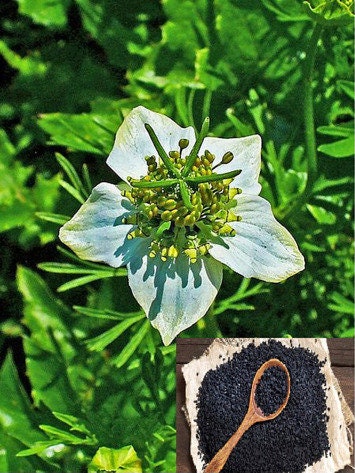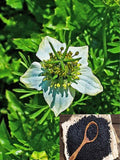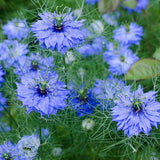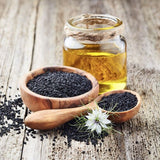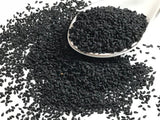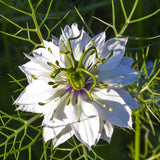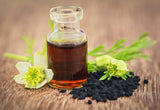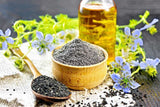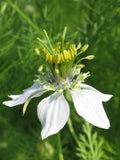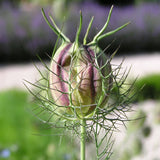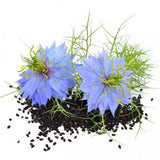The fruit is a large and inflated capsule composed of three to seven united follicles, each containing numerous seeds which are used as spice, sometimes as a replacement for black cumin (Bunium bulbocastanum)Nigella sativa At first glance this may appear to be the unassuming, old fashioned cottage flower, Love-in-a-Mist, but this species has a powerful twist. It’s also known as Black Seed, Black Cumin, Fennel Flower, and other misleading names, as it is neither cumin nor fennel. Its seeds are used in Eastern dishes for adding a bracing zest as well as medicinally for treating a laundry list of maladies. These undemanding plants will reach 8-10 inches tall with a very similar look to its Love-in-a-Mist cousin. Once the balloon-shaped seed pods mature, you can collect the seed for grinding as a seasoning or extracting the delicious oil.Botanical Name: Nigella sativa
Common Names: Black Cumin Seed, Black Seed, Kalonji Count: ~250+ Recommended Uses: Culinary Height: 8 – 12 inches Hardiness: zones: 10a Flower Color: Pale blue to white Black-Caraway, Kalonji Self-seeding annual. 95 days Requirements: Full sunlight. Good drainage.You may or may not have heard of Black seed (nigella sativa) before. It goes by many names, including black caraway, Roman coriander, and black cumin, to name a few. But no matter what you call it, these seeds are loaded with health benefits that we are only beginning to understand. From eliminating harmful bacteria to regenerating the body’s cells and tissues, here are 10 awesome research-backed health benefits of black cumin.Nigella sativa (black seeds), an annual flowering plant that grows to 20-30cm tall, is native to Asia and the Middle East. The flowers of this plant are very delicate and pale colored and white. The seeds are used in Middle Eastern cooking, such as in their local breads. The seeds are also used by thousands for their natural healing abilities.Black Cumin Seeds (Nigella sativa) is one of the most revered medicinal seeds in history. Black cumin seeds were found in the tomb of Tutankhamun. Black Cumin Seeds can be grown for a versatile little herb plant that has fine, divided, aromatic leaves. The flowers are small and white. It is one of the oldest known herbs to be cultivated as both a medicinal herb and as a culinary herb. Low-growing plant seldom exceeding 6" in height. Seeds are used as a flavoring in soups, stews, curry powder, and pastries. In traditional herbal medicine cumin is used as a diuretic and to treat stomach upset and flatulence. Modern interest focuses on use as an antihistamine. Mentioned in the Bible as “fitches”. An Arab proverb says black cumin is a cure for everything except death.Nigella sativa seeds have traditionally been used as a spice in Indian and Middle Eastern cuisine where it is referred to as “kalonji”. Their flavor profile is savory, pungent and slightly bitter to taste. Also called black cumin seed, black seeds are employed to flavor curries, vegetables, and breads. Indigenous to the Mediterranean and now growing around the world, nigella seeds can also be used in tea or added to coffee as a unique flavoring.We stand behind the quality of our seed. All our garden seeds are heirloom, open-pollinated, naturally grown, and Non-GMOSow Outside: Cover seed. Sow every three weeks from just before the last frost until the start of summer; and again in autumn (in warm areas). Spacing 10 to 12 inches (20 to 30 cm). Sow Inside: Use peat pots. Germination time: two to three weeks. Temperature 70°F (21°C). Seven or eight weeks in advance. Transplant outdoors following the last frost or in autumn.Other Names:Ajenuz, Aranuel, Baraka, Black Cumin, Black Caraway, Charnuska, Cheveux de Vénus, Cominho Negro, Comino Negro, Cumin Noir, Fennel Flower, Fitch, Graine de Nigelle, Graine Noire, Kalajaji, Kalajira, Kalonji, La Grainer Noire, Love in a Mist, Mugrela, Nielle, Nigella sativa, Nigelle de Crête, Nigelle Cultivée, Nutmeg Flower, Poivrette, Roman-Coriander, Schwarzkummel, Small Fennel, Toute Épice, Upakuncika. The seeds are also used by thousands for their natural healing abilities.1. Type 2 diabetes – Researchers found that just two grams daily of black seed could result in reduced fasting blood sugar levels, along with decreased insulin resistance, and increased beta-cell function in the pancreas. 2. Epilepsy – Published in Medical Science Monitor, one study found black seed to be effective at reducing the frequency of seizures in children who resisted conventional treatment. Black seed indeed has anti-convulsive properties. 3. Colon Cancer – In cell studies, black seed has been found to have anti-cancer properties, inhibiting the growth of colon cancer cells specifically. In one animal study, the seed was able to fight colon cancer in rats successfully with no observable side effects. The same obviously can’t be said for conventional cancer treatments. 4. MRSA – The deadly and antibiotic-resistant bacterial infection known commonly as MRSA responded favorably to treatment with black seed in this study from the University of Health Sciences in Lahore, Pakistan. 5. Protection Against Heart Attack Damage – An extract from black seed has been shown to possess heart-protective qualities, dampening damages associated with heart attacks and boosting overall heart health. 6. Breast Cancer – A few studies have linked a thymoquinone extract from nigella sativa to reduced breast cancer tumor growth and increased apoptosis (cell death) in breast cancer cells. 7. Brain Cancer – A study published in the online journal PLoS One indicates thymoquinone from black seed can induce cell death in glioblastoma cells. Glioblastoma is one of the most aggressive brain tumors of all. 8. Leukemia – As it’s been shown to do with other types of cancer, black seed compound thymoquinone has also been shown to induce apoptosis in leukemia cells. 9. Brain Damage from Lead – A study published in Experimental and Toxicologic Pathology indicates black seed is able to dampen and reverse damage to the brain sparked by lead toxicity. 10. Oral Cancer – Research indicates thymoquinone from nigella sativa is able to induce cell apoptosis in oral cancer cells.
Common Names: Black Cumin Seed, Black Seed, Kalonji Count: ~250+ Recommended Uses: Culinary Height: 8 – 12 inches Hardiness: zones: 10a Flower Color: Pale blue to white Black-Caraway, Kalonji Self-seeding annual. 95 days Requirements: Full sunlight. Good drainage.You may or may not have heard of Black seed (nigella sativa) before. It goes by many names, including black caraway, Roman coriander, and black cumin, to name a few. But no matter what you call it, these seeds are loaded with health benefits that we are only beginning to understand. From eliminating harmful bacteria to regenerating the body’s cells and tissues, here are 10 awesome research-backed health benefits of black cumin.Nigella sativa (black seeds), an annual flowering plant that grows to 20-30cm tall, is native to Asia and the Middle East. The flowers of this plant are very delicate and pale colored and white. The seeds are used in Middle Eastern cooking, such as in their local breads. The seeds are also used by thousands for their natural healing abilities.Black Cumin Seeds (Nigella sativa) is one of the most revered medicinal seeds in history. Black cumin seeds were found in the tomb of Tutankhamun. Black Cumin Seeds can be grown for a versatile little herb plant that has fine, divided, aromatic leaves. The flowers are small and white. It is one of the oldest known herbs to be cultivated as both a medicinal herb and as a culinary herb. Low-growing plant seldom exceeding 6" in height. Seeds are used as a flavoring in soups, stews, curry powder, and pastries. In traditional herbal medicine cumin is used as a diuretic and to treat stomach upset and flatulence. Modern interest focuses on use as an antihistamine. Mentioned in the Bible as “fitches”. An Arab proverb says black cumin is a cure for everything except death.Nigella sativa seeds have traditionally been used as a spice in Indian and Middle Eastern cuisine where it is referred to as “kalonji”. Their flavor profile is savory, pungent and slightly bitter to taste. Also called black cumin seed, black seeds are employed to flavor curries, vegetables, and breads. Indigenous to the Mediterranean and now growing around the world, nigella seeds can also be used in tea or added to coffee as a unique flavoring.We stand behind the quality of our seed. All our garden seeds are heirloom, open-pollinated, naturally grown, and Non-GMOSow Outside: Cover seed. Sow every three weeks from just before the last frost until the start of summer; and again in autumn (in warm areas). Spacing 10 to 12 inches (20 to 30 cm). Sow Inside: Use peat pots. Germination time: two to three weeks. Temperature 70°F (21°C). Seven or eight weeks in advance. Transplant outdoors following the last frost or in autumn.Other Names:Ajenuz, Aranuel, Baraka, Black Cumin, Black Caraway, Charnuska, Cheveux de Vénus, Cominho Negro, Comino Negro, Cumin Noir, Fennel Flower, Fitch, Graine de Nigelle, Graine Noire, Kalajaji, Kalajira, Kalonji, La Grainer Noire, Love in a Mist, Mugrela, Nielle, Nigella sativa, Nigelle de Crête, Nigelle Cultivée, Nutmeg Flower, Poivrette, Roman-Coriander, Schwarzkummel, Small Fennel, Toute Épice, Upakuncika. The seeds are also used by thousands for their natural healing abilities.1. Type 2 diabetes – Researchers found that just two grams daily of black seed could result in reduced fasting blood sugar levels, along with decreased insulin resistance, and increased beta-cell function in the pancreas. 2. Epilepsy – Published in Medical Science Monitor, one study found black seed to be effective at reducing the frequency of seizures in children who resisted conventional treatment. Black seed indeed has anti-convulsive properties. 3. Colon Cancer – In cell studies, black seed has been found to have anti-cancer properties, inhibiting the growth of colon cancer cells specifically. In one animal study, the seed was able to fight colon cancer in rats successfully with no observable side effects. The same obviously can’t be said for conventional cancer treatments. 4. MRSA – The deadly and antibiotic-resistant bacterial infection known commonly as MRSA responded favorably to treatment with black seed in this study from the University of Health Sciences in Lahore, Pakistan. 5. Protection Against Heart Attack Damage – An extract from black seed has been shown to possess heart-protective qualities, dampening damages associated with heart attacks and boosting overall heart health. 6. Breast Cancer – A few studies have linked a thymoquinone extract from nigella sativa to reduced breast cancer tumor growth and increased apoptosis (cell death) in breast cancer cells. 7. Brain Cancer – A study published in the online journal PLoS One indicates thymoquinone from black seed can induce cell death in glioblastoma cells. Glioblastoma is one of the most aggressive brain tumors of all. 8. Leukemia – As it’s been shown to do with other types of cancer, black seed compound thymoquinone has also been shown to induce apoptosis in leukemia cells. 9. Brain Damage from Lead – A study published in Experimental and Toxicologic Pathology indicates black seed is able to dampen and reverse damage to the brain sparked by lead toxicity. 10. Oral Cancer – Research indicates thymoquinone from nigella sativa is able to induce cell apoptosis in oral cancer cells.

